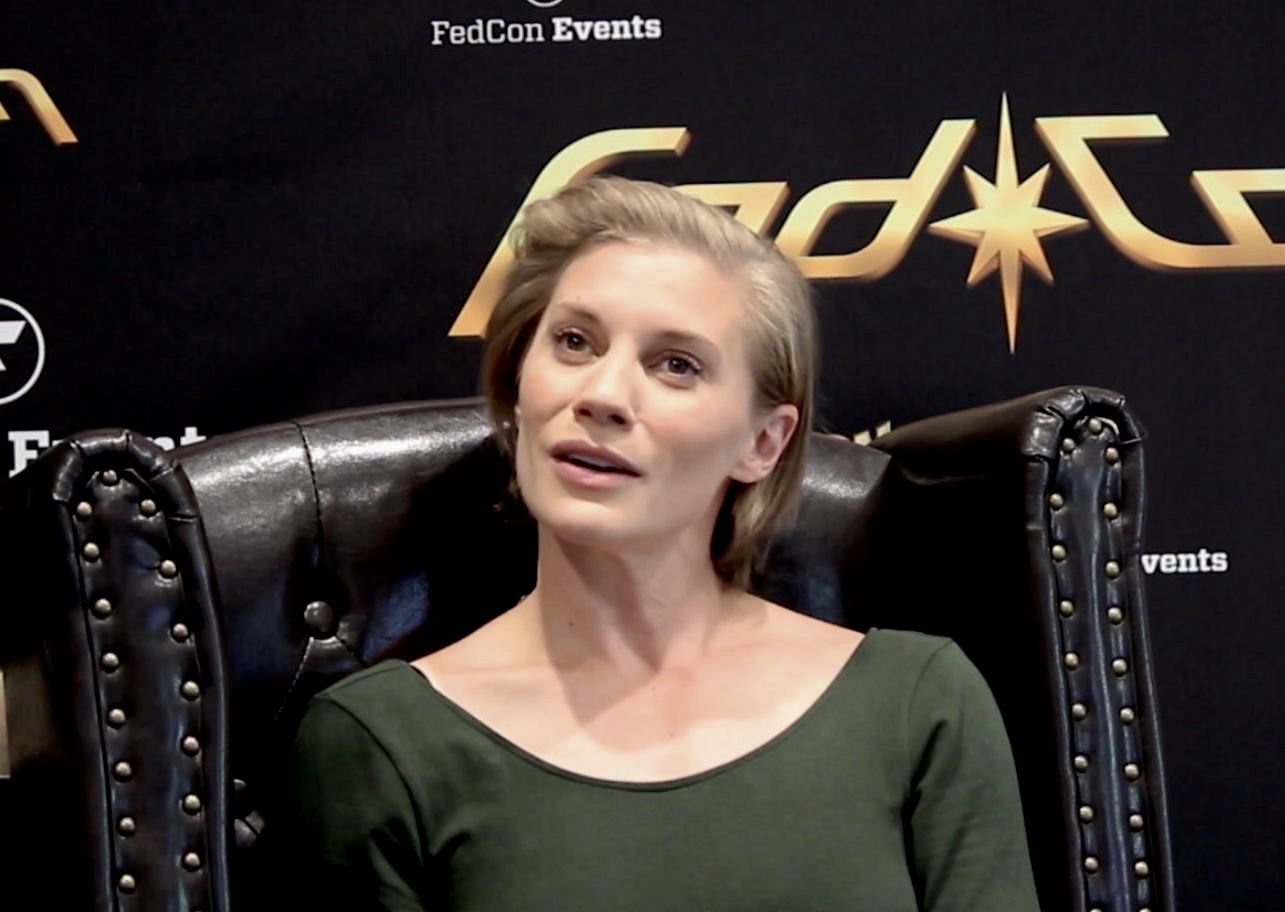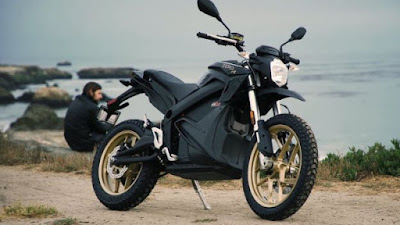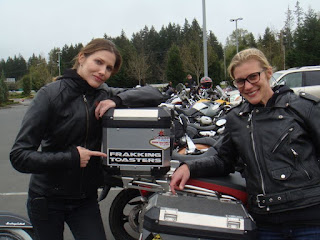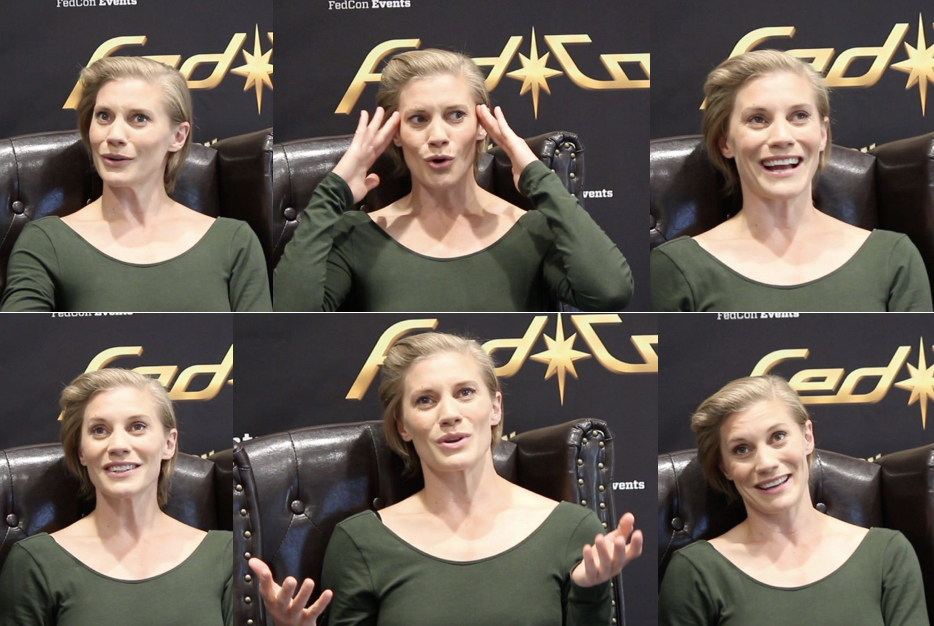The organizers of
Fedcon, the huge science fiction/fantasy/science convention that was held in Bonn last May, kindly arranged an interview with
Katee Sackhoff (Starbuck in
Battlestar Galactica) for me during the convention, which hosted most of
BSG’s cast as well as many other actors from
Star Trek,
Stargate and scientists from the European Space Agency.
Katee’s most recent movie project,
2036 Origin Unknown, has just become available:
As a
Battlestar Galactica fan, it was a pleasure for me to meet Katee in FedCon’s perfectly organized and pleasantly quiet interview room. She is as spontaneous and delightful in person as she is captivating on screen.
Since I was at FedCon as a science writer (I write for
Le Scienze, the Italian edition of
Scientific American), my questions were focused more on science than on science fiction, so this is perhaps a rather unusual interview. Here it is in full: minor edits have been made for clarity. I'd like to thank Lisa “AlcoholicRobot” for the transcript.
P: First of all, what's your relationship with science and technology? Are you an Android person? Or an iPhone person?
K: So, uhm, I am terribly bad at technology. All technology scares me. I have an iPhone, only because I tried to switch to an Android and my iPhone wouldn’t... My number wouldn't go to the new phone and all my SMSs weren't coming through... It was a nightmare and I was in Dubai and I couldn't get numbers, so I took the SIM out and went and bought an iPhone and popped it back in an iPhone in Dubai, it was like "phew". So yes, if I could have a flip phone I would...
P: You would go back to a flip phone?
K: Oh, God, in a heartbeat!
P: My wife has one, yes.
K: I hate that we live in a world where you are instantaneously findable and if you’re not accessible people get mad at you, you know? Or they'll send you an e-mail and when you don't respond immediately... they won't call you, they'll just send you another e-mail, and it's like, but I don't check my phone first thing in the morning. So, yeah, I am really bad at technology. Trying to find an oven, now, is the hardest thing you will ever have to do, because there are smart ovens. I don’t want a smart oven, I want to turn on and my oven gets hot and I don't need my oven to tell me how to roast a chicken, I don't need my oven to tell me, you know, when to turn my pan if I'm making cookies... I just want to turn the darn thing on. It's hard, they don't exist.
P: I know, I know, my wife has the same problem! Second question: talking about technology, you’re a motorcycle enthusiast.
K: Yes.
P: Have you tried electric motorcycles yet?
K: I have actually never tried an electric motorcycle.
P: Would you?
K: No.
P: (laughing) Why?
K: It actually has everything to do, in my opinion, with safety. So I'm a firm believer that loud pipes save lives. And I think that the louder the motorcycle, the more visible you become, especially in Los Angeles. So it is... I don't know if I would want to go on something that's so quiet, you know, I mean, I almost got hit by a Prius the other day because I couldn't hear it as a person crossing the street. So I can't imagine, you know, with cars switching lanes as readily as they do in Los Angeles that you wouldn't sort of, be in harm’s way. That being said, I do like the mechanical bicycles because it can help you get up a hill.
P: You’d never try an electric? Even on a racing circuit?
K: Yeah, of course I would, in a contained environment absolutely, and at some point we may have no choice, I mean I don't think in our lifetimes, but maybe in our children's children's lifetimes, you know, petrol won't exist, so...
P: This leads to my third question: you're very keen on environmental issues, your Acting Outlaws initiatives are wonderful. You're doing a lot for animals and for nature in general. Would you like to talk about that?
K: Yes, absolutely, so Tricia Helfer [Number Six in Battlestar Galactica] and I started the company Acting Outlaws. We really were searching for a way to sort of marry our love of motorcycle riding with philanthropic goals, and it sort of just happened easily actually and seamlessly. When the Gulf oil spill happened in Louisiana, we wanted to raise awareness somehow, because it was a year later and people had... Our news cycles are so current, they're so quick and fast-paced that, you know, a year after something people don't talk about it anymore, a week after something people don't talk about it anymore. So we wanted to raise awareness that oil was still an issue, and so we rode the motorcycles from Los Angeles to Louisiana and we sort of talked about it on the way there, and we met a lot of really interesting people.
One of the best people that we met was a cattle rancher on our way there through Texas, really lovely man. We stopped on the side of the road and he came out ’cause we was like "What are these people doing?", it was a very isolated road, and he came out in his bathrobe and was like "What are you guys doing?" And we explained him what we were doing and, you know, in Texas, a cattle rancher wrote us a check for fifty dollars for an environmental cause, which to us was so polar opposite because, you know, industrialized farm animals are some of the biggest pollutants to the environment, and then you sort of think about Texas and you think about big trucks and lots of industrial farm animals and that's just sort of where your mind stereotypically goes to. And so to have this person sort of come out and throw that in our faces and make us sort of go "Ok, the environment matters to everyone". Everyone needs to make a living, and that's what this person does but that was a really cool moment for us and we sort of realized that what we were doing was important, the environment is important and we only get one planet, like, one body so if we destroy it...
P: There's no planet B.
K: We're not gonna go somewhere else, you know, it's what we're leaving in this place as for our children and generations to come is a sad, sad state and we're gonna leave them with something that is irreversible. The problem with global warming is that it should've just been called climate change from the very beginning, because people don't associate the planet getting warmer with climate change. But what they don't seem to realize is that global warming is just temperatures extremes and fluctuations and irregularities, and yes, there is a natural progression to the earth and we are just cycling back and yes, we can make all these arguments, but human beings are exacerbating and we’re speeding it up, so I think it's our duty to sort of try and protect the earth the way that she's protecting us.
P: Do you have time for one more? Final question?
K: Yes.
P: In your role, acting in science fiction, this has given you a platform of visibility. Do you think that this is helping you to also communicate science? You're breaking the barrier, instead of preaching to the choir, to people who are already interested in science, and bringing new people in? What kind of reaction do you get?
K: I think so a little bit, I think as actors we sort of need to know our place a little bit as well, I think that there are a certain group of people that want actors to just be actors and not have an opinion and not open our mouths because that’s not what they are following us for, which I completely understand that, and then there are another group of people that want us to use that platform for something greater than ourselves. Being in science fiction, I think the funny thing is people just assume I'm intelligent. And they just assume that I know things and that I love science and I read the New England Journal on a daily basis, and I know everything about new science or whatever. I have a high school diploma. Everything I learned in my mind is self-learned and from world travel and talking to people and trying to be a sponge. So I do believe that I do have a voice and I try to use that, but I think if anyone is looking for scientific knowledge they should look at people that are much more educated than I am and then I will dissect that information and put it in a palatable, more understandable form.
P: That’s wonderful! Thank you very much.
We chatted off the record a little longer and then my time was up. Final surprise: as I said goodbye and left the interview room, a familiar face appeared. It belonged to Italian astronaut Samantha Cristoforetti, who was also on stage at Fedcon to talk about her experience in space. She posted a wonderfully geeky tweet with Katee Sackhoff:
This article is free to read and contains no adverts thanks to donations by readers of this blog. If you enjoyed it, you can support my work through Paypal (paypal.me/disinformatico), Bitcoin (3AN7DscEZN1x6CLR57e1fSA1LC3yQ387Pv) or other methods. Thanks for reading!





